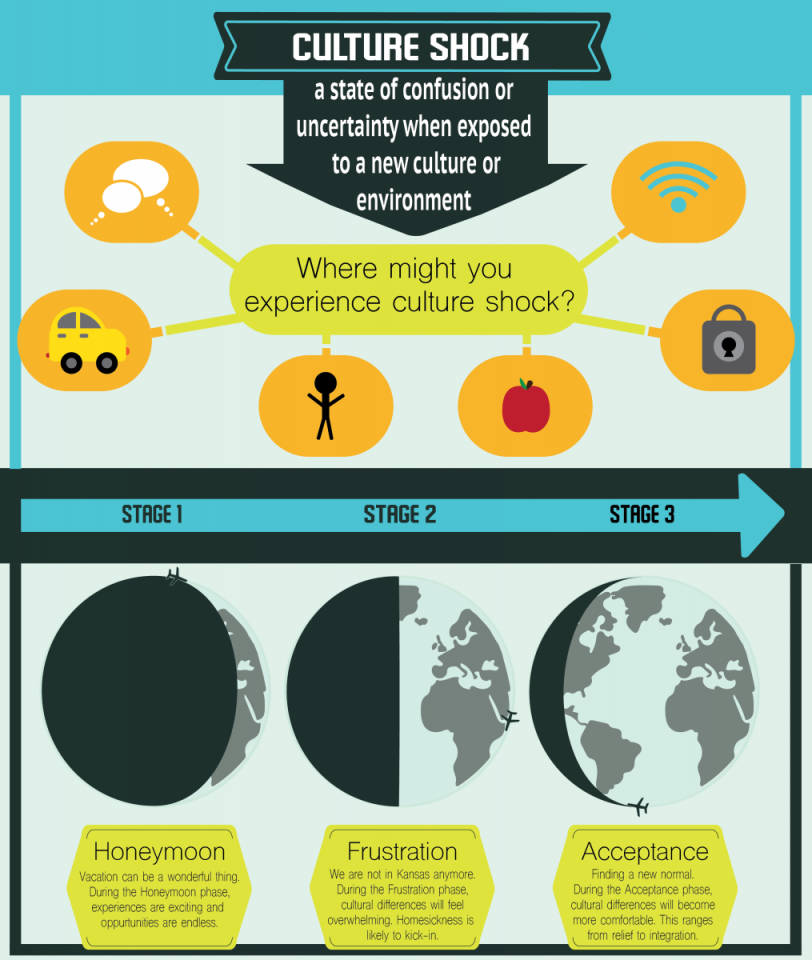During and immediately after your arrival in your host country, you may be excited by the cultural differences you encounter. Sometimes, the excitement of arrival begins to gradually wear off and as you settle into your routines in this new culture, you may find yourself feeling challenged or frustrated by these differences. This transition, known as culture shock, is a natural part of the adaptation process during study abroad.
It might help to think of culture shock as an ongoing experience rather than just one moment during your study abroad semester. You might feel euphoric and excited when you arrive; those feelings, however positive, are part of the culture shock experience. Gullahorn and Gullahorn's W-Curve Hypothesis Model of Culture Shock argues that students experience multiple waves of highs and lows as they adjust to their host culture. Learning about these stages before you experience them may help you develop strategies to combat negative feelings and help you adjust when you begin your time abroad.
The cultural adjustment process has many highs and lows. No matter how much preparation you do and how open-minded that you are about your upcoming experience, you are bound to experience a bit of culture shock at some point while you are abroad. We encourage students to identify some strategies before they leave campus that may help them deal with those moments when you are feeling mentally exhausted from navigating another culture. The smallest bit of preparation before you leave can go a long way towards helping you navigate these stressful or difficult moments.
Your study abroad advisor can certainly help you strategize, but here are some tips and ideas we think will suit every study abroad student as they prepare for culture shock:
- Do you have some of the basic phrases memorized in your host country language?
- What novels, moves or music will help you de-stress? Have those items readily available!
- Consider investing in a journal so you can jot down your thoughts whenever you’re feeling overwhelmed.
- Think about bringing a few recipes for your favorite comfort foods – you can always share those with new friends.
Having a plan to deal with culture shock is one strategy to handle the low points so that you can more quickly get back to pushing yourself to learn beyond your comfort zone.
In addition to these strategies, you may just need to be more patient and flexible than you're used to while you're navigating these new challenges. Don't necessarily expect to hit the ground running and let yourself off the hook for misunderstanding things in your new host country. The study abroad experience is a great opportunity to develop adaptability and flexibility, skills that will help you as you enter the job market upon graduation! Just remember that it takes time to develop these skills. Creativity and resourcefulness will help you to respond to challenges and to take advantage of the opportunities available to you while studying abroad.
We encourage you to read about culture shock in order to understand how to work through the ups and downs you might be experiencing during your time abroad so that you can successfully adapt to your host culture.
We realize that this semester or year may be a particularly challenging one as you navigate cultural shock, differences in academic expectations, hybrid or online courses, and an additional layer of COVID-related culture shock as many host countries transition through various stages of vaccination regimes, reopening, etc. Your provider or host university may provide mental health resources to you as part of your program fee. Program staff can also assist you with locating mental healthcare providers in your host country if needed. While students can typically use resources on-site through their provider or host university, keep in mind these resources may differ from what you may encounter in the U.S. depending on your program as well as the host country’s culture respective to mental health. Before you depart, reach out to your program contact directly to ask about counseling and other services that may be available to you on-site.
All students studying in Tulane-approved programs must maintain a domestic and international health insurance policy while abroad. If you have opted to remain enrolled in TSHIP as your domestic policy, UnitedHealthcare, Student Resources, and HealthiestYou have partnered together to offer doctors and mental healthcare from anywhere you are, even while traveling internationally. All services are free for students covered under the UHCSR insurance plan; services are available for all other students for a fee, as noted here. Students who are not enrolled in TSHIP should research remote mental health resources available through their domestic provider.
Students navigating intersectional elements of identity--first-generation students, heritage students--may find the cultural adjustment process even more challenging. Visit our Identity-Based Resources page for more information or make an appointment with an OSA advisor to discuss your concerns.

